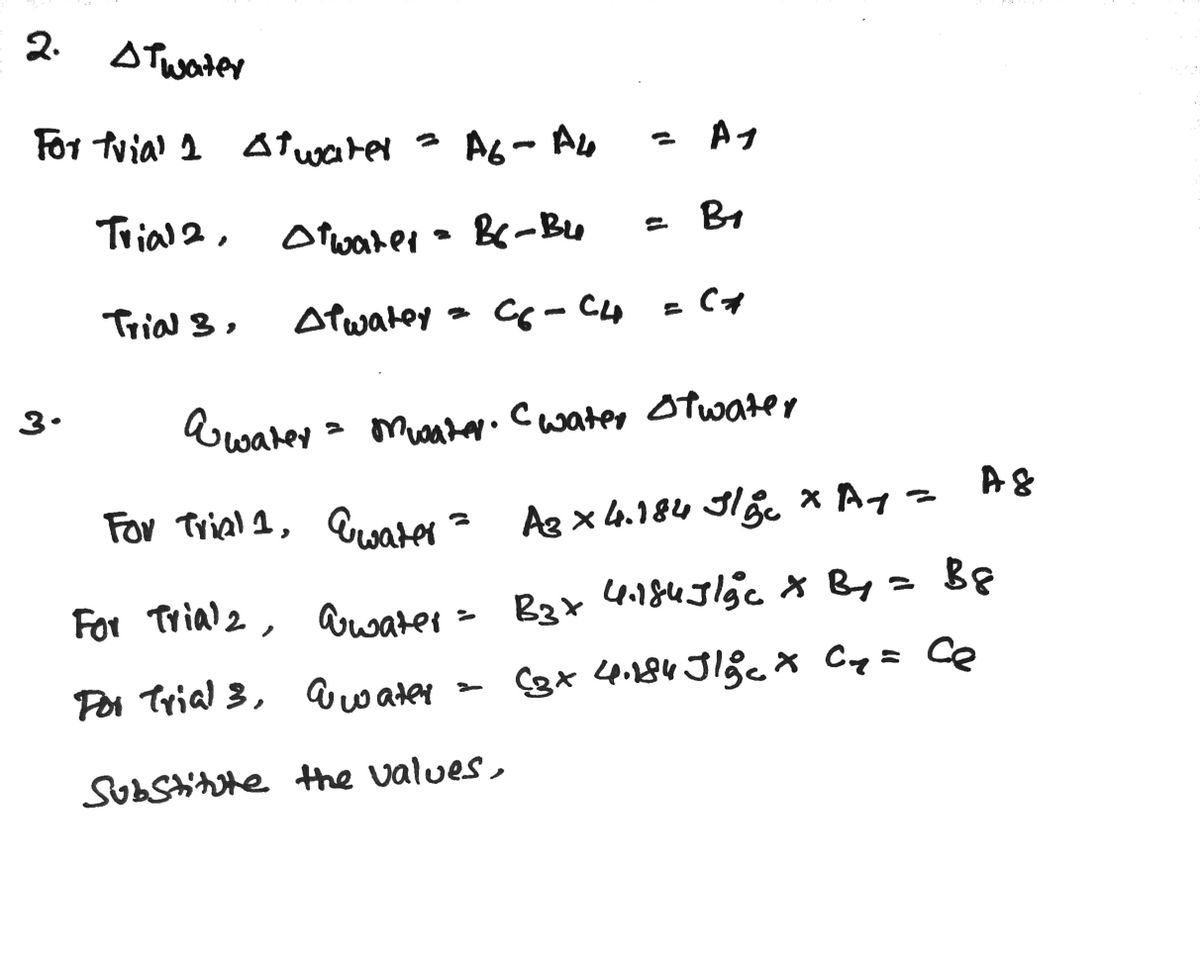Chem 14 Specifie Heat Capacity Lab Report Temperature of hot water bath(trial 3) L00: (C5) Final Temperature(trial 3): 23.5 (C6) Analyaia 1.) Look at your temperature data tables for the three trials. For each find the highest temperature that your calorimeter reached. This is the final temperature of both the calorimeter and the metal shot. Write this temperature in the data section on the (AB, B6, C6) line. 2) Calculate the change in temperature of the water in your calorimeter, AT AT Te-T CA6, B6, C6)-M, B4, C4) Aw=27.2 Blo = 24.4 Cu = 23-5 AT (trial 1)- CAT) AT (trial 2)= (B7) A4= 244 G4= 214 C4= 20-2 AT (trial 3)- (CT) 3.) Calculate the amount of energy that went into warming up the water in your 9 AT Here m. is what you wrote for (AS, B3, C3), 4184 and AT A7, B7, C7). x4.184 Jig-Cx CAS) A3= 84.118 Q(trial 1) = C3-77.397 q(trial 2)= x4.184 Jig Cx CB8) 67: C7= Q(trial 3)= x4.184 Jig-Cx (C8) 2 of 4
Chem 14 Specifie Heat Capacity Lab Report Temperature of hot water bath(trial 3) L00: (C5) Final Temperature(trial 3): 23.5 (C6) Analyaia 1.) Look at your temperature data tables for the three trials. For each find the highest temperature that your calorimeter reached. This is the final temperature of both the calorimeter and the metal shot. Write this temperature in the data section on the (AB, B6, C6) line. 2) Calculate the change in temperature of the water in your calorimeter, AT AT Te-T CA6, B6, C6)-M, B4, C4) Aw=27.2 Blo = 24.4 Cu = 23-5 AT (trial 1)- CAT) AT (trial 2)= (B7) A4= 244 G4= 214 C4= 20-2 AT (trial 3)- (CT) 3.) Calculate the amount of energy that went into warming up the water in your 9 AT Here m. is what you wrote for (AS, B3, C3), 4184 and AT A7, B7, C7). x4.184 Jig-Cx CAS) A3= 84.118 Q(trial 1) = C3-77.397 q(trial 2)= x4.184 Jig Cx CB8) 67: C7= Q(trial 3)= x4.184 Jig-Cx (C8) 2 of 4
Chemistry
10th Edition
ISBN:9781305957404
Author:Steven S. Zumdahl, Susan A. Zumdahl, Donald J. DeCoste
Publisher:Steven S. Zumdahl, Susan A. Zumdahl, Donald J. DeCoste
Chapter1: Chemical Foundations
Section: Chapter Questions
Problem 1RQ: Define and explain the differences between the following terms. a. law and theory b. theory and...
Related questions
Question

Transcribed Image Text:Chem 143
Specific Heat Capacity Lab Report
Temperature of hot water bath(trial 3):
100 7
(С5)
Tw = -9m
Final Temperature(trial 3):
23.5
(C6)
Analysis
1.) Look at your temperature data tables for the three trials. For each find the highest
temperature that your calorimeter reached. This is the final temperature of both the
calorimeter and the metal shot. Write this temperature in the data section on the (A6,
B6, C6) line.
2.) Calculate the change in temperature of the water in your calorimeter, ATwater.
ATWater= Trfinal-Tinitial= (A6, B6, C6)-(A4, B4, C4)
Alo=27.2
Blo = 24.4
cle = 23.5
ATWater (trial 1)=
(A7)
%3D
A4= 24.4
34= 21.4
C4= 20.2
ATWater (trial 2)=
(B7)
%3D
ATWater (trial 3)=
(C7)
3.) Calculate the amount of energy that went into warming up the water in your
calorimeter. We will call this qwater. Use the following equation.
9Water= mWater°C Water"A Twater
Here mwater is what you wrote for (A3, B3, C3), cWater=4.184
g.°C
J
and ATWater=(A7, B7, C7).
qWater (trial 1) =
x 4.184 J/g.C x
A3=84.118
(A8)
B3C 82.789
(3=77.397
QWater (trial 2) =
x 4.184 J/g-C x
(B8)
%3D
A7=
B7=
QWatar(trial 3)
x 4.184 J/g.C x
%3D
(С8)
C7=
2 of 4
Expert Solution
Step 1

Step by step
Solved in 2 steps with 2 images

Recommended textbooks for you

Chemistry
Chemistry
ISBN:
9781305957404
Author:
Steven S. Zumdahl, Susan A. Zumdahl, Donald J. DeCoste
Publisher:
Cengage Learning

Chemistry
Chemistry
ISBN:
9781259911156
Author:
Raymond Chang Dr., Jason Overby Professor
Publisher:
McGraw-Hill Education

Principles of Instrumental Analysis
Chemistry
ISBN:
9781305577213
Author:
Douglas A. Skoog, F. James Holler, Stanley R. Crouch
Publisher:
Cengage Learning

Chemistry
Chemistry
ISBN:
9781305957404
Author:
Steven S. Zumdahl, Susan A. Zumdahl, Donald J. DeCoste
Publisher:
Cengage Learning

Chemistry
Chemistry
ISBN:
9781259911156
Author:
Raymond Chang Dr., Jason Overby Professor
Publisher:
McGraw-Hill Education

Principles of Instrumental Analysis
Chemistry
ISBN:
9781305577213
Author:
Douglas A. Skoog, F. James Holler, Stanley R. Crouch
Publisher:
Cengage Learning

Organic Chemistry
Chemistry
ISBN:
9780078021558
Author:
Janice Gorzynski Smith Dr.
Publisher:
McGraw-Hill Education

Chemistry: Principles and Reactions
Chemistry
ISBN:
9781305079373
Author:
William L. Masterton, Cecile N. Hurley
Publisher:
Cengage Learning

Elementary Principles of Chemical Processes, Bind…
Chemistry
ISBN:
9781118431221
Author:
Richard M. Felder, Ronald W. Rousseau, Lisa G. Bullard
Publisher:
WILEY